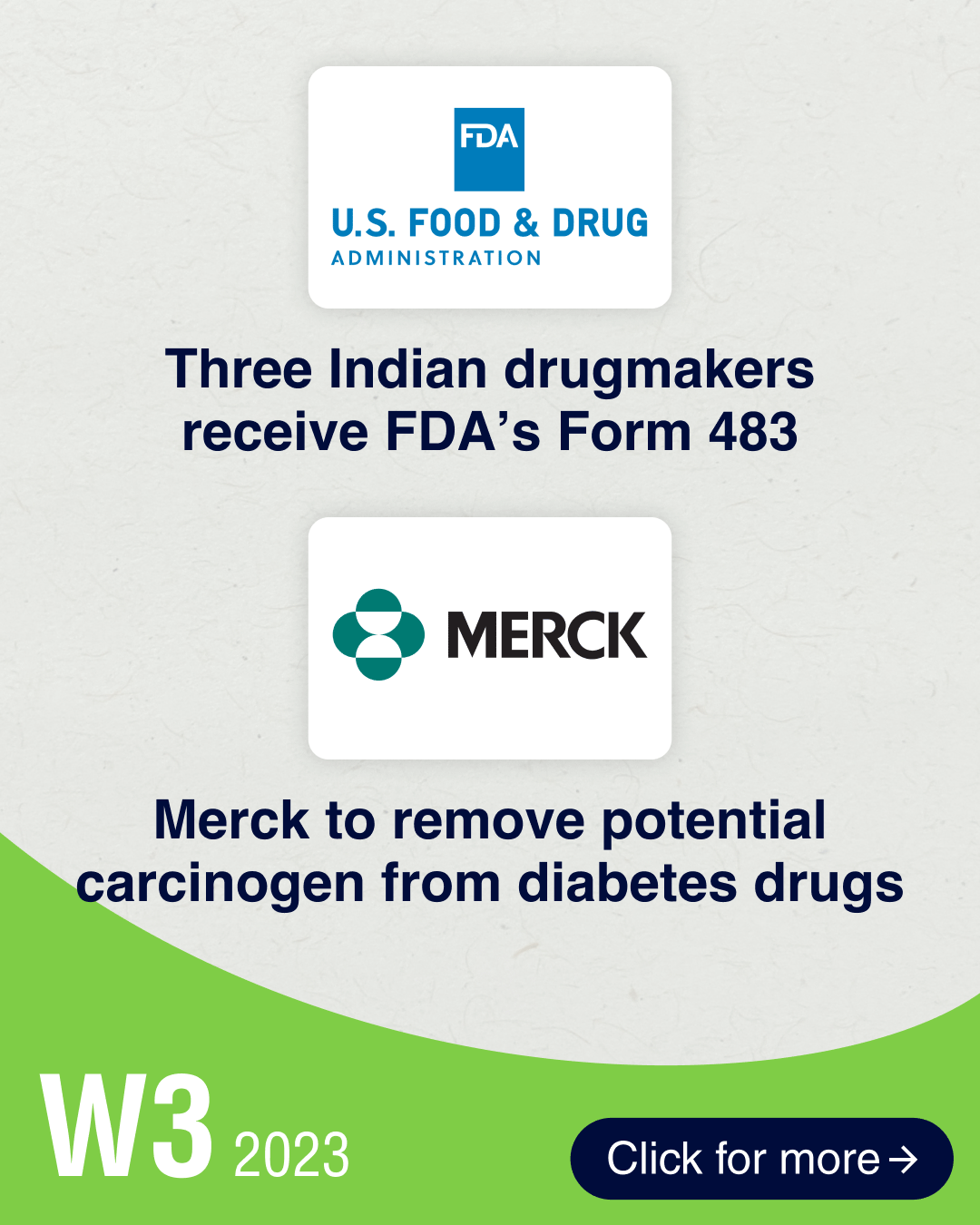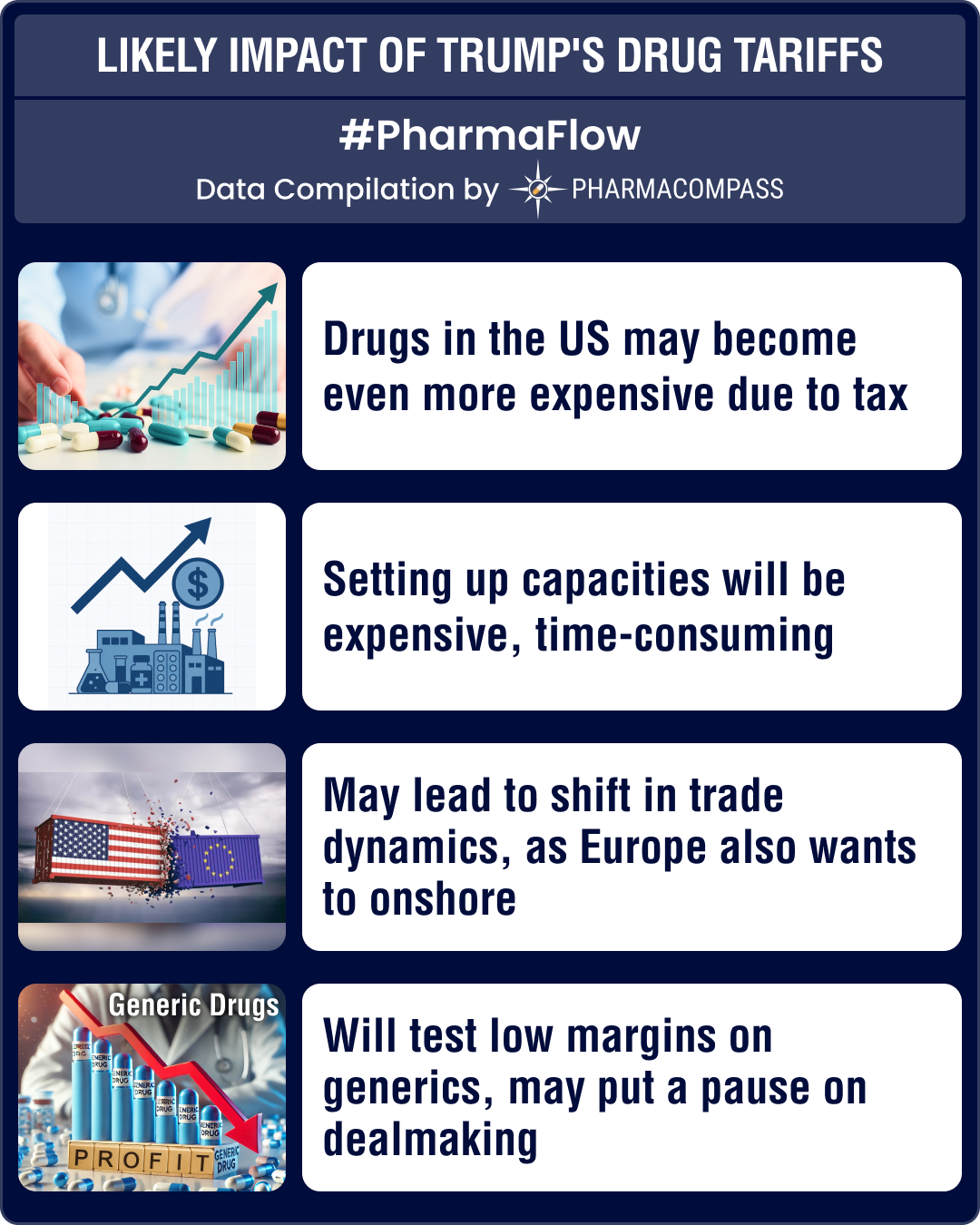
By PharmaCompass
2023-01-19
Impressions: 2,149
Last week, the US Food and Drug Administration (FDA) had flagged problems at manufacturing facilities of Intas and Sun Pharma. This week, three other Indian drugmakers – Lupin, Aurobindo Pharma and Granules India – have received the agency’s Form 483s, spelling more trouble for India’s US$ 50 billion pharmaceutical industry, which is the world’s largest exporter of generic drugs.
In August, FDA had found a potential cancer-causing agent – Nitroso-STG-19 – in some samples of Merck’s blockbuster diabetes drugs Januvia and Janumet. Now, Merck has identified the main reason behind the contamination and plans to remove the contaminants by year end.
The European Union plans to amend its pharmaceuticals law to address the shortage of antibiotics and other medicines in member countries. The revisions are set to take place in March.
Pfizer will provide its entire range of 500 drugs and vaccines to 45 low-income countries on a not-for-profit basis. And, an ex-Takeda employee and her boyfriend were arrested in the US last week for allegedly defrauding the Japanese drugmaker of around US$ 2.3 million between 2018 and 2022.
Granules India, Aurobindo’s India sites, Lupin’s US facility hit by FDA’s Form 483
This hasn’t been a great month for Indian drugmakers. After last week’s news of FDA’s Form 483 issued to Intas’ India facility, and a warning letter issued to Sun’s Halol (Gujarat, India) plant, this week there is news of another three Indian drugmakers in FDA’s line of fire.
One, FDA has issued a Form 483 with two observations to Aurobindo Pharma’s wholly-owned subsidiary – APL Health Care Limited. The company’s plant in Telangana that manufactures orals and derma products was inspected from January 8 to 18.
Two, Granules India’s Gagillapur facility in Hyderabad (Telangana, India) has been hit by a Form 483 with three observations following a pre-approval inspection by the FDA from January 9 to 13. The facility manufactures finished dosages and pharmaceutical formulation intermediates.
And Lupin’s manufacturing facility at Somerset in New Jersey received a Form 483 with two observations. The agency had carried out an inspection from January 2 to 13.
These regulatory problems spell bad news for India’s US$ 50 billion pharmaceutical industry, which is reeling under the ‘deaths by cough syrups’ controversy after children in The Gambia and Uzbekistan died recently, allegedly due to the consumption of cough syrups manufactured by Indian drugmakers Maiden Pharmaceuticals and Marion Biotech. India is the world’s largest exporter of generic drugs.
Merck to remove potential carcinogen from two blockbuster diabetes meds by year end
In August, FDA had found a potential cancer-causing agent – Nitroso-STG-19 (NTTP) – in some samples of Merck’s blockbuster diabetes drugs Januvia and Janumet.
Now, Merck has identified the main reason for the contamination of its diabetes meds, both of which contain the compound sitagliptin, and plans to address the issue by the end of this year, Bloomberg News reported.
Merck has submitted a report to the FDA and other regulators, identifying the root cause for the presence of NTTP in some batches of the drugs. The contamination occurred mostly during storage and manufacturing, the report said.
EU to amend pharmaceuticals law to address medicine shortages
The European Union is planning to amend its pharmaceuticals law to address the shortage of antibiotics and other medicines in several of its member countries. The revisions, which will include increased obligations for the supply of medicines and earlier notice of shortages, are set to take place in March, EU Health Commissioner Stella Kyriakides said.
Several European countries are facing a shortage of medicines this winter due to insufficient production capacity and an unexpected early surge in respiratory infections. The EU is taking all necessary regulatory steps and talking to drugmakers to boost production and alleviate shortages.
Additionally, EU’s health crisis body – Health Emergency Preparedness and Response Authority (HERA) – may also procure medicines and medical supplies for member states.
EMA considers monitoring of patients on Zolgensma: In August, there was news that two children with spinal muscular atrophy had died after receiving Novartis’ gene therapy Zolgensma – a one-time treatment for the fatal disease. Both patients had died of acute liver failure.
Last week, the European Medicines Agency (EMA) said it is considering the possibility of advising doctors to closely monitor patients on Zolgensma for liver injury. The agency is planning to write to doctors with further information on the safety risk and how to handle it.
Ex-employee, boyfriend held for defrauding Takeda of US$ 2.3 million
A former technology employee at Takeda Pharmaceutical’s US headquarters in Massachusetts and her boyfriend were arrested last week for allegedly setting up fake consulting firms and defrauding the Japanese drugmaker of around US$ 2.3 million between 2018 and 2022.
Priya Bhambi (39) and Samuel Montronde (37) have been accused of scheming via text messages to set up fake consulting firms to provide information technology services to Takeda. The couple allegedly used the money to buy a Mercedes-Benz for around US$ 59,000 last June. Bhambi also bought a condominium for around US$ 1.9 million in an upscale Boston neighborhood.
Bhambi had joined Takeda in November 2017 after four years at Cambridge-based Biogen. She was later promoted to chief of staff, global data and technology. Bhambi was fired last November after an internal investigation. Bhambi and Montronde have been charged with wire fraud.
Pfizer to provide 500 drugs and vaccines to low-income countries at non-profit prices
Pfizer said it will provide its entire range of drugs and vaccines to 45 low-income countries on a not-for-profit basis. A total of 500 products, including patented and off-patent medicines such as chemotherapies and oral cancer treatments, will be made available as part of its program – An Accord for a Healthier World.
The drugmaker had first launched the program in May last year and had made available 23 of its patented products on a not-for-profit basis, including its antiviral Covid-19 treatment Paxlovid and breast cancer drug Ibrance.
Another J&J’s HIV vaccine found to be ineffective; drugmaker halts late-stage trial
Johnson & Johnson’s attempt to be first-off-the block with an HIV vaccine has, once again, met with failure. The drugmaker’s Janssen unit has halted a late-stage global trial of its HIV vaccine after an independent data and safety monitoring team found the experimental regimen to be ineffective at preventing HIV infection.
The study, which began in 2019 and included about 3,900 patients spread over 50 sites, involved administering two different types of a shot that uses a cold-causing virus to deliver the genetic code of HIV, spread over four vaccination visits in a year. This setback comes after another J&J HIV vaccine failed a trial in August 2021.The PharmaCompass Newsletter – Sign Up, Stay Ahead
Feedback, help us to improve. Click here
Image Credit : Phisper Infographic by SCORR MARKETING & PharmaCompass license under CC BY 2.0
“ The article is based on the information available in public and which the author believes to be true. The author is not disseminating any information, which the author believes or knows, is confidential or in conflict with the privacy of any person. The views expressed or information supplied through this article is mere opinion and observation of the author. The author does not intend to defame, insult or, cause loss or damage to anyone, in any manner, through this article.”








